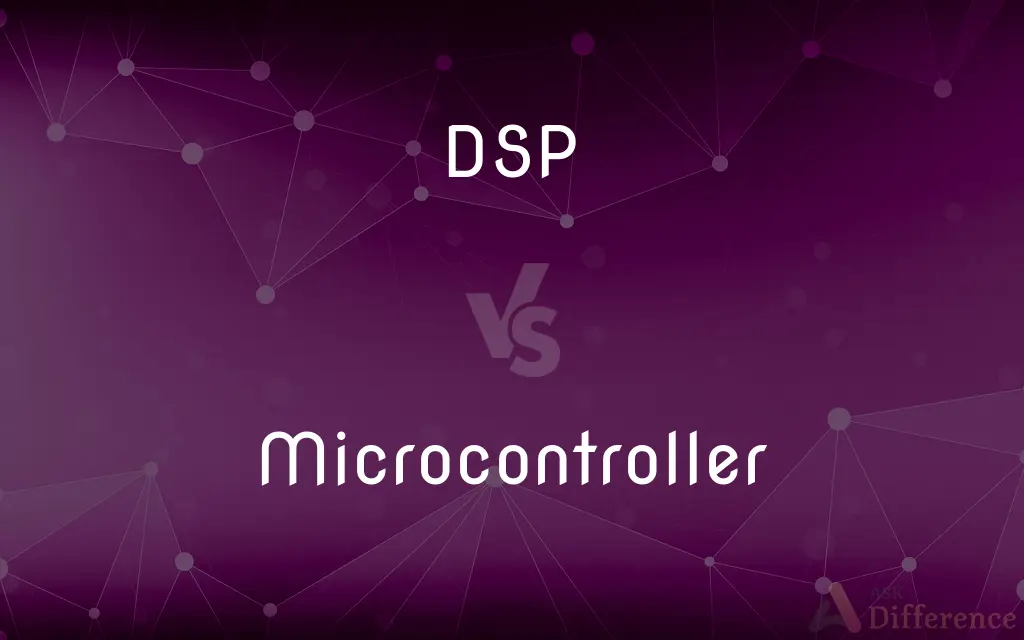DSP vs. Microcontroller — What's the Difference?
By Tayyaba Rehman — Published on December 18, 2023
DSP (Digital Signal Processor) handles high-speed signal processing; Microcontrollers are versatile chips for general-purpose tasks. Both are specialized silicon devices with distinct roles.

Difference Between DSP and Microcontroller
Table of Contents
ADVERTISEMENT
Key Differences
DSP and Microcontroller Functions: A DSP is designed specifically for high-speed digital signal processing tasks, like audio and video signal processing. On the other hand, a Microcontroller is designed for general-purpose tasks such as reading inputs, driving outputs, and executing specific commands in applications like appliances and toys.
DSP and Microcontroller Architecture: DSPs often have architectures optimized for mathematical operations and data throughput. Microcontrollers, in contrast, prioritize versatility, often integrating memory, I/O ports, and other peripherals on a single chip.
DSP and Microcontroller Applications: DSPs are commonly found in audio processing units, telecommunication devices, and image processing tools. Microcontrollers, meanwhile, are omnipresent in everyday devices, from washing machines to remote controls.
DSP and Microcontroller Complexity: While both DSPs and Microcontrollers are complex in their own right, DSPs tend to deal with more advanced mathematical algorithms compared to the logic-based functions of Microcontrollers.
DSP and Microcontroller Programming: DSPs are typically programmed using specialized tools and languages optimized for signal processing. Microcontrollers, on the other hand, are usually programmed using C, C++, or assembly language, and are geared towards general-purpose tasks.
ADVERTISEMENT
Comparison Chart
Primary Function
High-speed signal processing
General-purpose tasks
Typical Applications
Audio processing, telecommunication
Appliances, toys, remote controls
Integrated Components
Often optimized for data throughput
Often integrates memory, I/O ports, timers
Complexity
Advanced mathematical algorithms
Logic-based functions
Programming
Specialized tools and languages
General-purpose languages like C, C++, assembly
Compare with Definitions
DSP
Crucial in audio and video applications.
High-end televisions often incorporate DSPs for superior image quality.
Microcontroller
An integrated circuit designed for specific control tasks.
The remote control uses a microcontroller to send commands to the TV.
DSP
Optimized for high-speed mathematical operations.
The DSP ensures real-time processing of the incoming data.
Microcontroller
Used in everyday electronic devices.
The washing machine's operation is controlled by a microcontroller.
DSP
A specialized chip for digital signal processing.
The audio system uses a DSP for enhanced sound clarity.
Microcontroller
Contains CPU, memory, and I/O in one chip.
The microcontroller in the thermostat regulates the room temperature.
DSP
Used in telecommunication for data modulation.
Modern cellular networks use DSPs for efficient data transmission.
Microcontroller
Programmable for various applications.
The same microcontroller can be programmed for different tasks in multiple devices.
DSP
Allows efficient handling of large data streams.
DSPs in radar systems process vast amounts of data rapidly.
Microcontroller
Operates at lower speeds than general-purpose CPUs.
The microcontroller in a digital watch efficiently manages timekeeping tasks.
Microcontroller
A microcomputer on a single chip, used to control some device such as an automobile engine or a toy.
Common Curiosities
Where might I encounter a Microcontroller in everyday life?
Microcontrollers are common in everyday devices like remotes and appliances.
Is a DSP better than a Microcontroller?
Neither is "better"; DSPs are optimized for signal processing, while Microcontrollers are versatile for general tasks.
Can a Microcontroller handle signal processing tasks?
While possible, Microcontrollers aren't optimized for high-speed signal processing like DSPs.
Do DSPs and Microcontrollers overlap in functionality?
There's some overlap, but each is optimized for different tasks.
Are DSPs found in smartphones?
Yes, smartphones use DSPs, especially for tasks like audio processing and image enhancement.
What is the primary purpose of a DSP?
A DSP is primarily used for high-speed digital signal processing tasks.
What kind of operations does a DSP excel at?
DSPs excel at high-speed mathematical operations, especially for audio and video signals.
What is a typical application for a Microcontroller?
A typical application might be controlling the operations of a microwave or a digital thermometer.
Are all Microcontrollers small in size?
While many are small, size varies based on functionality and integrated components.
Can I program a Microcontroller using Python?
Some Microcontrollers support Python, especially with platforms like MicroPython.
Can DSPs manage general-purpose tasks like Microcontrollers?
While possible, DSPs aren't optimized for generic tasks like Microcontrollers.
Are Microcontrollers more energy-efficient than DSPs?
Generally, Microcontrollers are designed for efficiency, while DSPs prioritize performance.
How do I choose between a DSP and a Microcontroller for my project?
Consider the primary task: if it's signal processing, choose a DSP; for general control, choose a Microcontroller.
Are Microcontrollers found in computers?
Yes, Microcontrollers are often used in peripheral devices and various system controls in computers.
What programming languages are used for DSPs?
Often specialized languages or tools, though C and C++ can also be used.
Share Your Discovery

Previous Comparison
While Loop vs. Do-While Loop
Next Comparison
EBIT vs. PBITAuthor Spotlight
Written by
Tayyaba RehmanTayyaba Rehman is a distinguished writer, currently serving as a primary contributor to askdifference.com. As a researcher in semantics and etymology, Tayyaba's passion for the complexity of languages and their distinctions has found a perfect home on the platform. Tayyaba delves into the intricacies of language, distinguishing between commonly confused words and phrases, thereby providing clarity for readers worldwide.
















































